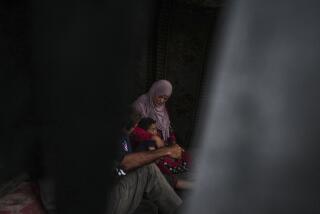Iraqi Date Industry Lies in Ruin
- Share via
SIBAH, Iraq — As a boy, Abdul Jawad Jasem used to wander in the lush greenery of his father’s 3,000 date palm trees. He could never have imagined then that wars would someday destroy the huge, thriving date industry here, leaving him a single tree to bequeath to his grandson.
Not far from the lone tree, across a patch of arid soil covered in spindly weeds, are the ruins of his old house, which was destroyed during the Iran-Iraq war of the 1980s. He cannot look at this place without tears.
“The trees were already big when I was a boy,” said Jasem, 67. “That tall tree there is the only one left.”
The date palm is the symbol of Basra, Iraq’s second-largest city, where a huge palm is emblazoned on the gates of Saddam Hussein’s former palace.
But locals who boast of Basra’s past fame for the most succulent and sweetest dates, which were once exported to the United States, Britain and Africa, can’t help but sigh at the fate of the industry and the small, shrunken, dry specimens the region now produces.
Thousands of verdant date palm farms once covered a great swath of territory south from Basra to the Al Faw peninsula, but most of the farmers fled during the Iran-Iraq war. The government then turned off the irrigation and the army ripped out the trees to deprive any invading enemy soldiers of potential cover. They dumped the tree stumps in the desert, where some still lie. Tanks churning across the land destroyed the topsoil.
Wars and the U.N. sanctions that followed Hussein’s invasion of Kuwait have left deep scars on Iraq. But now that his regime has fallen to U.S. and British forces, Iraqis are telling their history, stories once forbidden under Hussein but which now reverberate and multiply, reflecting the trauma of a nation.
Two decades ago, recalled Jasem, he could buy just about anything he wanted on the money he earned from the 1,200 date palms he inherited from his father.
“It was a good life,” he said. “We loved date picking, because we knew it would bring us food.”
When the war with Iran began, Jasem fled with his family south to Umm al Qasr. His son Basem, 18, was drafted and killed in that war.
Every few months, Jasem would return by bus to check on his trees, which were slowly dying for lack of water. He tried to tend them, pruning the withered fronds. Then about four years after leaving, he came back to find mostly barren land and the trees’ stumps discarded in the desert.
“I was very upset and angry. I felt like I needed to tell somebody, but I could not. I was crying, thinking that these were my trees, and my father’s and my grandfather’s. The trees were part of my soul. They were more than friends to me.
“I thought, ‘It’s finished.’ I didn’t come back after that.”
After the Iran-Iraq war, few date farmers returned. There was nothing to come back to.
Jasem tried to make a life in Umm al Qasr. He worked in the port as an electrician. His son Kareem, now 41, drove a taxi.
But four years ago, Kareem was accused of opposition activities by the Hussein regime and sentenced to 20 years in jail. The authorities seized the family car. Jasem could not pay the rent and was forced to return to Sibah to scrape out a living.
“I’ve lost everything,” he said.
Kareem was recently released under an amnesty decreed by Hussein before the government collapsed.
In 1979, there were about 7 million trees in and around Basra, but a decade later, the number had fallen to 3 million, similar to today’s figure.
“We’ll never reach 7 million trees again,” said Ahmed Abdul Hussein, 50, manager of the Department of Agriculture in Abul Khasib, south of Basra.
“There are not enough date farmers left to develop this activity. They can’t develop their land because it costs too much,” he said.
Since 1989, he added, the department has attempted to revive date farming, but because of high salinity in the irrigation water and soil, only 10% of newly planted trees survived.
Abas Ali Sabeh, a date farmer in the Abul Khasib area, seems fortunate compared with Jasem. Water spews from a pipe to irrigate his 400 trees. But he too is unhappy. The land he took over from his father used to support 4,000 date palms, he recalled. Many trees died because of the water’s high salt content.
His 400 trees bring in only about $120 a year, so Sabeh survives on the vegetables he grows and the salary he earns driving an old bus.
“To us, dates are life. I used to be a king. I used to be able to buy anything. Now I can’t even buy a new dishdasha,” he said, tugging disgustedly at the ankle-length, shirt-like garment.
“I blame the Saddam government for what happened to the dates,” he said, “because they brought the war [with Iran].”
Samera Abed Shebeb, 40, a civil engineer at the Water Ministry, said the biggest problem faced by date farmers is the U.N. sanctions, which have prevented farmers from rebuilding their irrigation pumps and the government from constructing a badly needed desalination plant in Basra.
In another complication for the industry, she said, water in the canals has grown progressively saltier because of a steep decline in the volume of river water flowing into Iraq from the north.
“The land which the farmers left now has too much salinity to farm,” she said. “It needs a long process to repair the land, so it is difficult for them to start again.”
Jasem seems to sense this. He is too old and too tired for the task. He supports 16 family members in a two-room house, scraping out a living selling milk and raising cows for meat.
But his 14-year-old grandson, Mortada, still has dreams.
“If I have the chance,” the boy says, “I can restore our land to what it was before.”
More to Read
Sign up for Essential California
The most important California stories and recommendations in your inbox every morning.
You may occasionally receive promotional content from the Los Angeles Times.













